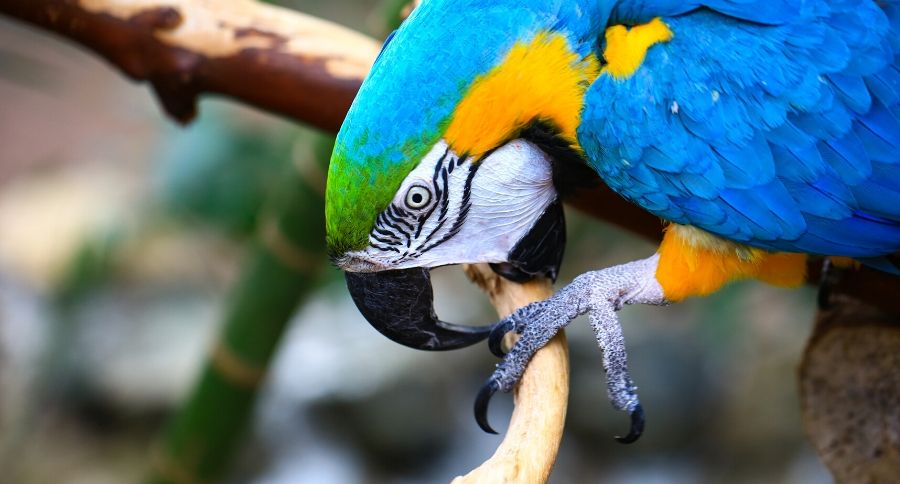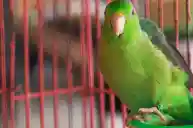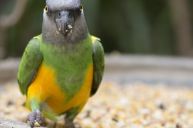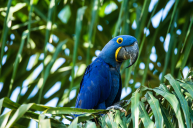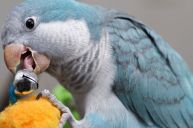Also known as the blue-and-yellow macaw, this is one of the most popular large parrots. Yet this is a bird you'll need to include in your will and have plans for if something happens to you! Their average lifespan is 50-years-old so depending on when you bring this pet bird into your home you'll need a plan for its overall care as it ages and as you age!
Their colors are very distinctive.
Experts at Lafber.com explain that when they blush their partially naked face will turn pink!
"This macaw has a green strip of feathers just above its black beak, and a partially naked face that will blush pink when it is excited. Its feet are dark gray or black, and it has a black "beard" of feathers just below its beak."
How do you care for such an intelligent bird? Training and a lot of enrichment of course!
How do you care for Blue and Gold Macaw parrots?
https://www.instagram.com/p/B6BeddwlC5X/
These beautiful birds may be even-tempered but that doesn't mean that they don't have a wild side to them. They are naturally curious and love to explore and play with their environment. Some macaws are even known to have a bit of a sense of humor, playing small practical jokes to get a reaction from their owners.
Macaws are social creatures and need plenty of time outside their cages each day. If they receive insufficient human attention, they can start to display destructive and loud behavior. They also require constant supervision, as they love to chew paper and wood items, such as furniture and books.
They need daily attention so this isn't a great pet bird for you if this isn't possible.
The Spruce Pets outlines what is needed when you start looking at aviaries.
- They must be provided with adequate space in which to live, play, and exercise.
- Macaws are prone to ear-shattering vocalizations and contact calls, which are often unappreciated by close neighbors. No apartments, please!
- You have to spend time socializing these birds properly and to provide them with adequate mental stimulation so that screaming doesn't become a habit out of boredom.
- The blue and gold macaw is a fantastic bird for tricks.
How long does a Blue and Gold Macaw live?
Experts at Lafeber.com tell us that if a blue-and-gold macaw remains healthy, it can live upwards of 70 years.
"This is a bird that will be with you for a lifetime, and you should prepare for this possibility, which may even include a trust or a clause in your Will dedicated to the bird."
Do these birds talk?
https://www.instagram.com/p/B6A6D_LlDr8/
Our fave fact after researching this macaw is that they learn quickly, so training is relatively simple as long as you're consistent. A vocabulary of around 20 words and phrases can be learned and the clarity of their voice makes many people consider them one of the best talking parrots!
What about overall temperament and health conditions?
They are prone to feather plucking if they're stressed or bored! There is nothing worse than a bird plucking out its feathers as I've seen it with our chickens. A balanced diet is very important and you can discuss nutritional requirements with your vet.
The best part about this bird is their personality. These birds have giant personalities and all macaw owners cannot imagine their life without these birds in it. Some say they're as friendly as some dogs.
Blue-and-gold macaws are native to South America and Central America, where they inhabit forests and woodlands. Their range includes Venezuela south to Peru, Brazil, Bolivia, and Paraguay, as well as parts of Panama.
Don't forget that these birds have loud vocalizations and there isn't much you can do about a screeching macaw. You'll want to consult with an aviary vet about their nutritional requirements and what fresh fruits and veggies are appropriate.
Our fave part after our research is their distinct coloring. Everyone recognizes their green forehead, fading into a teal blue that covers the nape, back, tail, and wings.
Also, some might refer to them as Ara araraunas which is their scientific name.
Have you ever seen a large parrot-like a macaw? Please leave us a comment below!
WATCH NOW: Budgerigars Are Little Birds!
